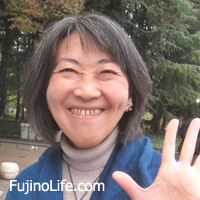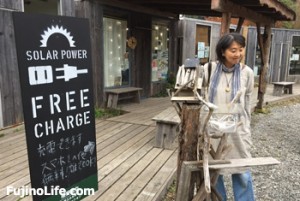The faces of Fujino
Introducing Mikae-san:
Mikae-san is the main point-of-contact for the Transition Town Fujino movement. Today she contributes broadly across multiple Transition Towns in Japan. Prior to coming to Fujino, however, Mikae-san was an overworked employee at a website development company in Tokyo. Her concept of success was financial security and material comforts. Yet, she felt unsettled. Mikae-san and her husband talked about wanting to change their lives, but they had no awareness of alternatives to the perpetual rush of city life. They wanted to feel more grounded to the earth but they didn’t know how.
Tell us something about yourself.
Mikae-san found her own life-transition here in Fujino. It started about 10 years ago when she was on vacation to the Ogasawara Islands. The guesthouse where she and her husband stayed practiced permaculture. The shower was rainwater heated by solar panels. The house was built by hand with local materials. The use of soap was prohibited to prevent pollutants from flowing into the river. “Before that stay, I had no knowledge of permaculture, but that experience changed the way I viewed the use of our earth’s resources.” She looked up the Permaculture Center of Japan (http://pccj.jp; only in Japanese) and found that it is in Fujino. Her first time to Fujino was to visit the Permaculture Center. For the whole of 2008, Mikae-san commuted from Tokyo to Fujino to learn about Permaculture. She also studied “natural farming” at the Nagano branch of the Permaculture Center.
While studying at the Permaculture Center, Mikae-san heard about a “long-house” initiative in Fujino. The “long-house” concept was four energy-efficient private households with shared common areas. Mikae-san joined the long-house project. She learned the traditional Japanese method to make adobe walls with bamboo lattice and mud. For the first time, she experienced a refreshing community collaboration as she worked on this large and complex project over a two-year period. When Transition Town Fujino started in 2008, everyone on the long-house project got involved. “Before working with people on the long-house, I had never experienced such fun community collaboration. My involvement in various Transition Town movements was also great fun. I got to do so many things that I had no previous experience and that I used to think would be impossible for me to do.”
What is something special that you like about Fujino?
The people in Fujino make Fujino special. I feel support from the people I recognize, and I feel free to greet people I don’t yet know. In Fujino, I believe I can achieve anything because people with diverse ideas and skills will support me. The Fukushima nuclear disaster in March 2011 was a time of fear and anxiety for me. When I was depressed, people were empathic. They told me that it’s ok to feel weak, and that we are all weak but we can all support one another. I received so much love, support, and encouragement from the people in Fujino that I know I want to stay with this community for the rest of my life.
Is there anything else you would like to share?
I hope you can come experience life in Fujino and share with me your observations, thoughts, and reactions. I would also like to hear stories about your life in your country.
Workshop
I lead the Transition Town Fujino 1-Day Tour. There are so many Transition activities happening simultaneously that we cannot cover all of them in one or two days. Each tour is a little bit different depending on the availability of various people throughout our community. Please see the overview of our 1-Day Tour under Workshops.
See other Fujino residents.
